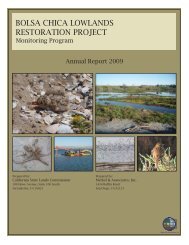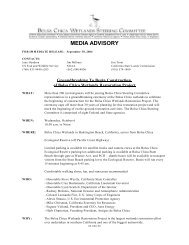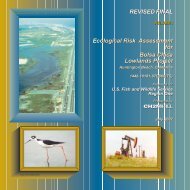2007 Annual Monitoring Report (pdf 16MB) - Bolsa Chica Lowlands ...
2007 Annual Monitoring Report (pdf 16MB) - Bolsa Chica Lowlands ...
2007 Annual Monitoring Report (pdf 16MB) - Bolsa Chica Lowlands ...
- No tags were found...
You also want an ePaper? Increase the reach of your titles
YUMPU automatically turns print PDFs into web optimized ePapers that Google loves.
<strong>Bolsa</strong> <strong>Chica</strong> <strong>Lowlands</strong> Restoration <strong>Monitoring</strong><strong>2007</strong> <strong>Annual</strong> <strong>Report</strong>The collected water quality data are presented in Figure 1-2. During the one-month period beginningon October 10, <strong>2007</strong>, temperature ranged from 14.3 to 20.4C at Station 1 and from 14.4 to 19.2C atStation 2, with a mean temperature of 18.3 and 17.1C at the two stations, respectively. Salinity wassimilar at both stations, with a mean of 33.4 ppt at Station 1 and 33.1 ppt at Station 2. The turbiditydata showed considerably more noise than would be expected, and it is believed that animals or driftalgae regularly passing near the optical sensor likely caused the erratic data. In general, turbidity atboth stations was very similar, with an average reading of about 8 NTU. Quality control readingstaken at time of deployment, retrieval, and mid-way through the logging period generally measured aturbidity between 4 and 12 NTU. Dissolved oxygen at Station 1 ranged from 4.7 to 9.5 mg/L, with amean of 7.0 mg/L. Dissolved oxygen data at Station 2 was not acceptable due to a steady decay insignal over the life of the deployment, again possibly related to probe fouling. However, pointsampling using tended instrumentation indicates DO levels to be comparable to those found at Station1 for the roughly the same sampling periods.DiscussionThe water quality conditions observed in the FTB during this first quarter of monitoring show the tidalmarine influence that now exists in the basin, reflecting the daily and monthly tidal fluctuations seen inthe open ocean. All parameters were well within acceptable ranges to support the developing fish,invertebrate, and vegetation communities, and are indicative of a well-flushed marine environment.The temperature data reflect the effects of solar heating and atmospheric cooling within the shallowFTB. In warmer months, there may be a stronger south to north gradient with the warmesttemperatures occurring at Station 1 at the north end of the basin, while the better-flushing southern endof the basin would be influenced by cooler oceanic water, maintaining lower temperatures during thesummer months.Dissolved oxygen concentrations in water are determined by a number of factors including: productionthrough photosynthesis, atmospheric gas exchange, oxygen consumption through biochemical oxygendemand and chemical oxygen demand, and saturation capacity as dictated by temperature, salinity, andbarometric pressure. Dissolved oxygen levels measured at <strong>Bolsa</strong> <strong>Chica</strong> were within the expected rangeand reflected the strong influence of diurnal tidal flow commonly seen in coastal bays and estuaries. Itis not uncommon for DO readings to rise and fall with tides as water masses with differing physicaland biotic conditions are exchanged. Future monitoring will help detect any unhealthy drops in DOduring warmer months, although this is not anticipated within the FTB, provided the ocean inlet isproperly maintained to provide tidal circulation throughout the basin.The absence of significant freshwater input into the FTB was evident in the salinity data, which closelyreflected oceanic salinities. Slightly higher salinities at Station 1 than at Station 2 are likely the resultof higher evaporation rates and greater residence time in the slightly shallower and warmer innerportions of the FTB. Future data collected in summer months will help explore this further and theaddition of the MTBs to the system will undoubtedly influence salinity levels.Merkel & Associates, Inc. 16






